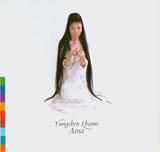AMA YUNGCHEN LHAMO Real World Records, 2006 $18.99 (CD)
TIBETAN VOCALIST Yungchen Lhamo grew up in Chinese-occupied Lhasa, where singing ritual music was punishable by beating or death. Despite the danger, her grandmother insisted on teaching her the devotional songs of Tibet in clandestine music lessons. Now, three decades removed and exiled from her homeland after a tortuous one-thousand-mile trek across the Himalayas to India in 1989, she has become the world’s most renowned interpreter of Tibetan folk music. This reputation is sure to be upheld by this year’s Ama, her third release on Peter Gabriel’s Real World Records.
A consummate musician who performs only a cappella in concert, Lhamo’s voice penetrates the listener. Her melodies are simply heartbreaking, and though most of Ama is recorded with instruments, it is the two a capella songs that demand the most attention. In “Someday,” dedicated to the current Dalai Lama and those of the past, Lhamo sings of returning to her homeland. By framing the song as an ode to refuge in Buddhism’s Triple Jewel—the Buddha, Dharma, and Sangha—Lhamo makes it clear that home, or refuge, is already inside each of us.

The other a cappella track, “9/11,” is the record’s highlight. By the time of the 9/11 attacks, Lhamo was living in America, having moved to Queens, New York, the year before. In just under five minutes the emotions of that day are recalled with layer after layer of heartfelt vocal perfection. Her mastery of breath and pitch is astonishing, and the focused power of her creative energy is felt in every note.
While Lhamo is most esteemed for her a capella prowess, this is no slight to the beautiful instrumentation found on the record. Traditional Tibetan instruments are featured, such as the gorgeousdanyen (three-stringed guitar) that leads the melody on “Ranzen” and “Om Mani Padme Hung,” as well as the gyumang (multi-string hammered dulcimer) and bamboo flute. Eastern modalities are played on Western instruments: electric guitar, trumpet, violin, and an assortment of percussion instruments are sprinkled throughout. New York cellist extraordinaire Rufus Cappadocia, who is accustomed to playing a variety of Eastern music (often pairing with the excellent ghazal vocalist Vishal Vaid), adds an underlying depth to three songs. African kora master Mamadou Diabate plays off the gyumang brilliantly on “Tara.” But even as such a wide range of instruments converge, the predominant feature remains Lhamo’s voice.
On “Tara” Lhamo collaborates with British vocalist Joy Askew, who adds a soulful dynamic unheard on Lhamo’s previous releases, Tibetan Prayer, Tibet, Tibet, and Coming Home.Askew’s deep, bluesy vocals merge with Lhamo’s unwavering melodies magnificently, as does guest Annie Lennox’s contribution on the dark and roving “Fade Away.” Lhamo penned “Fade Away” as a thank-you to those who showed kindness when she left her homeland, and the back-and-forth with Lennox conjures the communal spirit she praises through the song.
There is an old saying that merely to be in the presence of a master is to be illuminated. To hear Lhamo’s voice in the speakers or in concert is to be drawn further inside, reflective and inspired. In many respects she has taken on the role of bodhisattva, lifting others while journeying along her own path. With a record as beautiful and meaningful as Ama, the traveling becomes all the easier.
Thank you for subscribing to Tricycle! As a nonprofit, we depend on readers like you to keep Buddhist teachings and practices widely available.